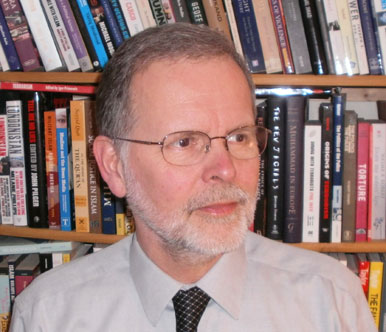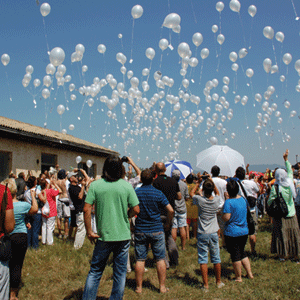
The strategy that earned Lambert such criticism is defended in his new book Countering al-Qaeda in London: Police and Muslims in Partnership. Following its establishment in early 2002, the handful of officers working in the Muslim Contact Unit set about identifying the Muslims they believed were best equipped to take on the so-called “hate preachers”, chief among them the infamous Egyptian Abu Hamza, who were believed to be serving as propagandists for al-Qaeda in London. Such preachers were most active in Brixton, where the radical black convert Abdullah el-Faisal had found popularity among other young converts, and Finsbury Park, where Hamza and his “Supporters of Sharia” group had seized control of the local mosque.
That they needed to be counteracted was entirely in line with wider counter-terrorism thinking, as was the notion that the challenge should come from within Muslim communities, but where the MCU diverged from the mainstream was in the view that the most suitable groups for standing up to Hamza and his ilk were those which themselves adhered to strict Islamic principles or held strong political views on the “War on Terror”. In Finsbury Park, the MCU entered into a partnership with the Muslim Association of Britain and the Muslim Welfare House, local groups with links to the international Islamist Muslim Brotherhood, while in Brixton they worked with adherents to a literalist Salafi interpretation of Islam. Both partnerships, in Lambert’s view, succeeded in reducing the influence of extremists, and he takes particular pride in the way the MCU and the Finsbury Park Islamists were able to engineer the removal of Hamza’s supporters from Finsbury Park Mosque in 2005 through the installation of a new board of trustees.
Speaking to Lambert following the publication of his book, I ask him whether the MCU set out with the intention of choosing Salafis and Islamists as partners. “I don’t think we did,” he explains. “We were looking for knowledge about al-Qaeda, so it was a question of who in the community had some expertise. That tended to mean groups that were in some ways Salafi because they tended to know about the problem. In Brixton they’d had first-hand dealings with the ‘shoe-bomber’ Richard Reid, in Finsbury Park they had knowledge, but you could go to other parts of London and they knew absolutely nothing. You can never really generalise, but I suppose the groups that would be more divorced from any knowledge would be the more quietist groups – Sufis, Barelvis – because they are in a world where they haven’t had direct experience.”
Some might argue that past dealings with individuals such as Reid or Hamza should mark a group out as unsuitable for assisting the police with counter-terrorism, but in Lambert’s view such experience was a key attribute in the battle with al-Qaeda. He points out that the Brixton Salafis had actually approached the police themselves in 1996 with concerns about Abdullah el-Faisal, to no avail, and emphasises the importance of working with groups that are able to appeal to the same audience targeted by violent extremists. He rejects the idea, promoted by the US and British governments in the aftermath of 9/11, that al-Qaeda’s terrorism is not fuelled by genuine political grievances, and believes it is essential that counter-extremism work appeals to young Muslims who may be susceptible to narratives about Israel-Palestine or the West’s role in the Islamic world. “Within the Met we felt that communities defeat terrorism,” he says, citing his experience tackling the IRA threat in the 1980s and ’90s. “Therefore some of the most important communities were the ones the terrorists were trying to recruit. You have to ask, what are the grievances the terrorists are exploiting? If you treat wider communities as suspect, and the people who hold those grievances think they are being targeted just because of their political views, then in my experience you will probably lose them.”
In order to win over those targeted by extremists, Lambert stresses that groups require a significant amount of street credibility. In Brixton, the individuals most susceptible to the violent extremists were young black converts with a history of crime, and it was thus advantageous that many of the local Salafis, led by the preacher Abdul Haqq Baker, came from that background. While some commentators have suggested that young Muslims could be steered away from extremism through the promotion of moderate strands of Islam such as Sufism, Lambert points out that al-Qaeda propagandists are not distorting Sufi teachings, but rather those of Salafis and Islamists. In his book he uses an analogy, given to him by a Brixton Salafi, that likens a moderate preacher trying to influence an al-Qaeda sympathiser to “Alex Ferguson successfully appealing to Liverpool supporters to defect to Manchester United”.
It follows, for Lambert, that Salafis and Islamists are best placed to win over those at risk of turning to violent extremism, and he argues that this can be done by providing young, politicised Muslims with positive ways of channelling their grievances. As evidence of success, he points out the way that the Finsbury Park Islamists played an important role in the Stop the War Coalition at the time of the invasion of Iraq, working in partnership with non-Muslim groups and the local MP Jeremy Corbyn, and have engaged in similar political activism over the Palestinian cause. This, he says, proved a blow to the extremists. “Abu Hamza and others hated to see young Muslims getting involved in mainstream politics,” he explains. “For them it was a failure, they were losing people. And therefore it felt like we were engaged in a very productive partnership.”
Few would argue with the right of Muslims to express legitimate political grievances, such as opposition to the wars in Iraq and Afghanistan. But where should the police draw the line in their engagement with the more strident Muslim groups? Critics of Lambert’s strategy suggest the MCU were happy to work with groups and individuals whose political views did not fall within the bounds of acceptable debate, particularly in relation to Israel-Palestine. For instance, one of those involved in ousting Abu Hamza from Finsbury Park Mosque, Azzam Tamimi of the Muslim Association of Britain, is a supporter of Hamas who controversially stated in a 2004 interview that dying for Palestinian justice would be “a noble cause”. While Tamimi strongly denied that he was condoning suicide bombing, the fact remains that he supports an organisation that has carried out such attacks. Similarly, Lambert has advocated engagement with Yusuf al-Qaradawi, the Egyptian cleric who was banned from entering Britain in 2008 and has a history of justifying suicide attacks in Israel.
Since retiring from the police, Lambert has continued to engage with Islamists in his capacity as an academic, and Exeter University’s European Muslim Research Centre, of which he is a director, has been heavily criticised for receiving funding from the Cordoba Foundation, an organisation which was described by David Cameron as “a front for the Muslim Brotherhood”. Recently, he has defended the Palestinian preacher Raed Salah, who is fighting a ban on entering the UK, imposed for alleged anti-Semitic remarks, including repeating the mythical “blood libel” about Jews baking bread with the blood of children. It is Lambert’s closeness to such Islamists that has seen him labelled a “fellow traveller”. One of his leading critics, Dean Godson of the Policy Exchange think-tank, has even suggested that Lambert and his MCU colleagues suffered from a form of “Stockholm Syndrome”, buying into the Islamists’ positive depiction of their ideology while turning a blind eye to their extremism.
The prevailing wisdom among policymakers now holds that Islamists and Salafis, who may have controversial views on international affairs, or advance conservative positions in relation to women’s rights or gay rights, make unsuitable partners. As a result, many of the MCU’s old partners have now been shunned, something Lambert insists is a mistake. “I honestly think that if Westminster politicians and think-tanks got to know many of the Salafis and Islamists who often tend to be put, wrongly, into this category of extremism, their fears would be allayed,” he says. “All the Muslims that I have ever worked with have what I believe is a very genuine commitment to British politics. I’ve seen people doing brave work on behalf of Londoners, and for them to now think that they are being targeted as a threat to a city that they love and have served so well is seriously unjust.” As an example, he cites the Brixton Salafis who, he says, achieved great success with their youth outreach scheme Strategy to Reach, Empower and Educate Teenagers (STREET), before having their funding withdrawn this year.
Hanging over the whole debate is the lack of clarity over the term “Islamism”. When I ask Lambert to tell me what he means when he uses it, he explains that Islamists tend to have “a stronger sense that Islam encourages them to be politically active”. But for others, “Islamism” clearly means much more than this, and has become a demon term that describes those Muslims who reject secular democracy and aspire to live in an Islamic state ruled by Sharia law, with all the detrimental effects to women’s and minority rights that would entail. Lambert tells me that the MCU “would not have partnered with anyone if they exhibited any hostility or hatred toward any other community, whether it be the Jewish community, gay community or women”, but it is still legitimate to ask whether groups which take inspiration from the Muslim Brotherhood, which has a controversial history on all of those counts, make suitable partners for the British state.
In the end it comes down to what you want from a counter-terrorism strategy – is its aim only to prevent violence, or should it have a remit that includes combating all forms of political extremism? Lambert’s approach at the MCU, though he disputes that his Islamist and Salafi partners were extreme, involved defending the right of Muslim groups to be radical but non-violent, and indeed annexing their political radicalism as a weapon against jihadi violence. This is in keeping with Britain’s history of accommodating political free expression within the boundaries of the law. But it does not follow that the government has to actively provide support to radical groups.
Indeed, the contemporary debate over terrorism has raised the question of whether, when it comes to Islam, we can afford to accommodate radical ideologies at all. David Cameron has called for an approach based on “muscular liberalism”, where Muslim groups advancing “un-British” values will be frozen out, and his government’s new counter-extremism strategy, influenced by the “conveyor belt” theory of terrorism, which holds that membership of non-violent Islamist groups can be the first step on an individual’s road to violence, takes an uncompromising approach towards such organisations. Those, like Lambert, who believe counter-terrorism should simply involve targeting those who advance violence, argue that the government is going too far. But those who believe it should involve targeting subversion, and moulding a moderate, distinctly British form of Islam, may well argue that it isn’t going far enough. This view is now in the ascendant. It remains to be seen if it will prove any more successful than the work of the MCU.
Countering al-Qaeda in London: Muslims and Police in Partnership by Robert Lambert is published by Hurst
Author's note: since this issue of New Humanist went to press, it has been revealed that Robert Lambert worked as an undercover police spy in the environmental movement in London during the 1980s. I have discussed this revelation, and the questions it raises about Lambert's MCU work and his arguments about counter-terrorism, in a post on the New Humanist blog.

